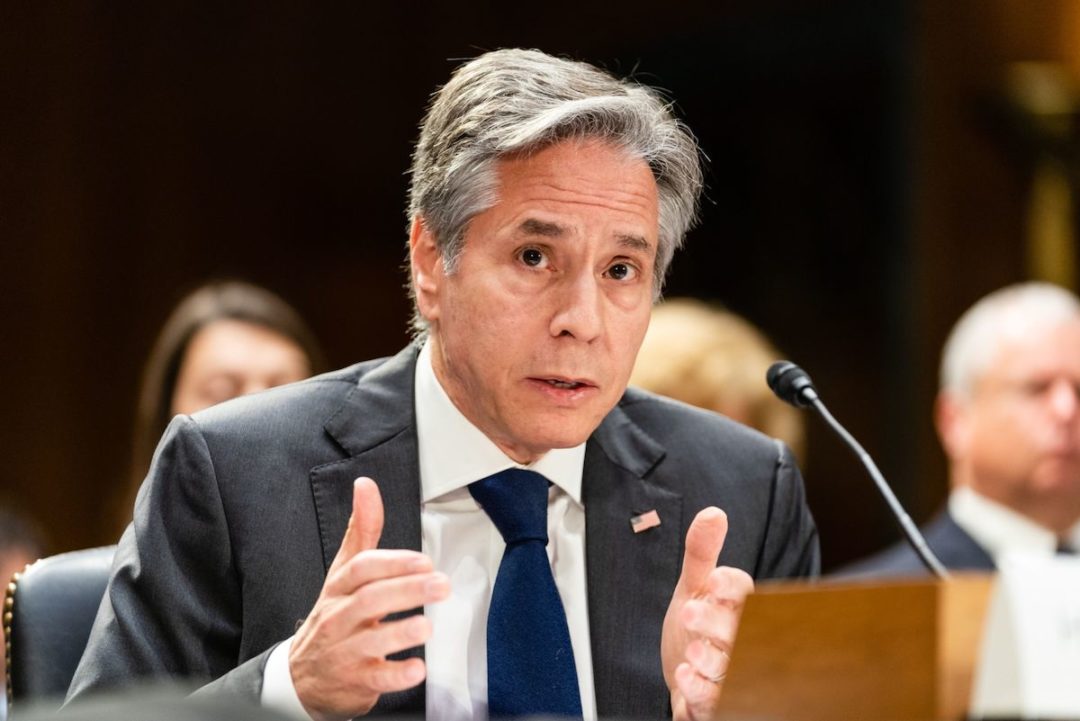
Visit Our Sponsors |
|
|
|
|
|
|
|
|
|
|
|
|
|
|
|
|
|
|
|
|
|
|
|
|
|
|
|
|
|
|
|
|
|
|
|
|
|
|
|
|

Photo: Bloomberg
Secretary of State Antony Blinken will travel to Beijing during the week of June 16, becoming the most senior U.S. official to visit the country since 2018 as the U.S. looks to ease tensions that have provoked fears of open conflict between the world’s two biggest economies.
The trip from June 16 to 19 will be Blinken’s first visit to China as secretary of state. U.S. officials sought to lower expectations about a major breakthrough, calling the trip a chance to resume communication that had been disrupted by months of tension.
“This is not a visit on which I would anticipate a long list of deliverables coming out of it,” Assistant Secretary of State Dan Kritenbrink told reporters after the trip was announced. “We’ll, at a minimum, reduce the risk of miscalculation so that we do not veer into potential conflict.”
The top U.S. diplomat will use his visit to try and ensure that Washington and Beijing develop lines of communication that are “open and empowered,” Kritenbrink said, and he will explore potential areas of cooperation with China, including on climate change and macroeconomic stability.
Blinken will reiterate that the U.S. wants to see peace in the Taiwan Strait and will raise U.S. concerns about a range of other issues including the situation in Ukraine, Kritenbrink added.
Read more: In the Nearshoring Game, Is China the Ultimate Winner?
Blinken had previously planned to visit Beijing in February but scrapped that trip after an alleged Chinese spy balloon was discovered in American airspace and later shot down by the U.S. Air Force.
That incident set off new strains, which have recently included encounters between U.S. and Chinese jets and ships in the Pacific and concerns that China may be gearing up to invade Taiwan in the coming years.
Seeking Normalcy
President Joe Biden has sought to restore some normalcy to a relationship that continues to be roiled by military encounters along with punitive economic measures and accusations from both sides that the other is jeopardizing global stability.
But China has rebuffed his request for a meeting or phone call with President Xi Jinping and also refused a U.S. request for a meeting between the two countries’ top defense officials in Singapore earlier in June 2023.
A Blinken trip to Beijing was one of the main outcomes of 2022's meeting between Biden and Xi in Bali, Indonesia. But a series of incidents keep derailing ties, including U.S. accusations that China may be weighing military support for Russia’s invasion of Ukraine.
Speaking to reporters during the week of June 14, Blinken said the U.S. had shared concerns with China over the issue but “to date, we’ve not seen that line crossed.”
Spying Concerns
Blinken’s trip also comes amid heightened concerns over China’s spying efforts after The Wall Street Journal reported that the Chinese and Cuban governments have secretly agreed to position spy facilities in Cuba.
The administration initially denied the report and then acknowledged Beijing had been operating a spy facility in Cuba since 2019. Blinken said later that the U.S. had engaged other nations to get them to reject Chinese efforts to expand intelligence collection in their countries, and that those efforts had since slowed.
Read more: U.S. Expands China Forced-Labor Embargo with Ban on Two New Firms
The Biden administration has “contested” Chinese spying efforts around the world, including in Latin America, and U.S. analysts “believe that in many places, we have impeded, slowed and even stopped Chinese ambitions,” Kurt Campbell, the White House coordinator for Indo-Pacific affairs, told reporters June 14.
“As the competition continues, the PRC will take provocative steps – from the Taiwan Strait to Cuba – and we will push back,” Campbell said, referring to the country’s formal name, the People’s Republic of China. “But intense competition requires intense diplomacy if we’re going to manage tensions.”
Beijing’s Message
Earlier on June 14, China said Foreign Minister Qin Gang told Blinken the U.S. should stop hurting China’s security interests in the name of competition. Qin also urged the U.S. to effectively manage differences to stabilize relations between the world’s two largest economies, according to a statement from the foreign ministry in Beijing.
Qin also “stated his solemn position on China’s core concerns such as the Taiwan issue,” according to the ministry statement, calling on the U.S. to “stop interfering in China’s internal affairs.”
Earlier in June 2023, a Chinese vessel harassed an American warship transiting the Taiwan Strait, an incident that occurred days after Taipei and Washington signed a trade agreement.
China has pledged to bring Taiwan under its control someday, by force if necessary. Biden has repeatedly said the U.S. would defend Taiwan if it was attacked.
RELATED CONTENT
RELATED VIDEOS
Timely, incisive articles delivered directly to your inbox.






